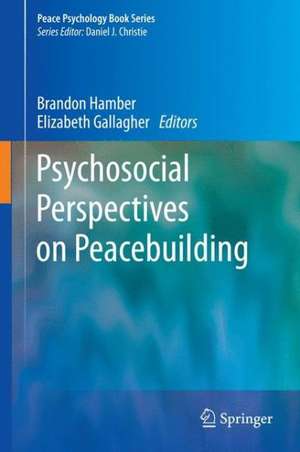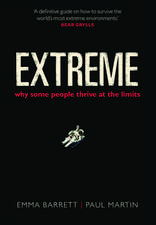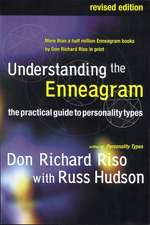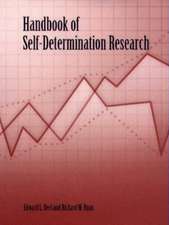Psychosocial Perspectives on Peacebuilding: Peace Psychology Book Series
Editat de Brandon Hamber, Elizabeth Gallagheren Limba Engleză Hardback – 18 noi 2014
| Toate formatele și edițiile | Preț | Express |
|---|---|---|
| Paperback (1) | 643.34 lei 43-57 zile | |
| Springer International Publishing – 10 sep 2016 | 643.34 lei 43-57 zile | |
| Hardback (1) | 649.54 lei 43-57 zile | |
| Springer International Publishing – 18 noi 2014 | 649.54 lei 43-57 zile |
Din seria Peace Psychology Book Series
- 18%
 Preț: 779.26 lei
Preț: 779.26 lei -
 Preț: 361.05 lei
Preț: 361.05 lei - 15%
 Preț: 639.25 lei
Preț: 639.25 lei - 18%
 Preț: 788.54 lei
Preț: 788.54 lei - 15%
 Preț: 699.28 lei
Preț: 699.28 lei - 15%
 Preț: 646.62 lei
Preț: 646.62 lei - 18%
 Preț: 1690.13 lei
Preț: 1690.13 lei - 15%
 Preț: 645.28 lei
Preț: 645.28 lei - 24%
 Preț: 1044.84 lei
Preț: 1044.84 lei - 18%
 Preț: 945.14 lei
Preț: 945.14 lei -
 Preț: 386.39 lei
Preț: 386.39 lei - 15%
 Preț: 697.82 lei
Preț: 697.82 lei - 15%
 Preț: 591.14 lei
Preț: 591.14 lei - 18%
 Preț: 1222.94 lei
Preț: 1222.94 lei - 15%
 Preț: 644.82 lei
Preț: 644.82 lei - 15%
 Preț: 649.22 lei
Preț: 649.22 lei - 15%
 Preț: 697.65 lei
Preț: 697.65 lei -
 Preț: 388.72 lei
Preț: 388.72 lei - 15%
 Preț: 647.08 lei
Preț: 647.08 lei - 24%
 Preț: 967.02 lei
Preț: 967.02 lei - 15%
 Preț: 638.89 lei
Preț: 638.89 lei - 15%
 Preț: 650.37 lei
Preț: 650.37 lei - 18%
 Preț: 733.15 lei
Preț: 733.15 lei -
 Preț: 398.74 lei
Preț: 398.74 lei - 15%
 Preț: 644.30 lei
Preț: 644.30 lei - 18%
 Preț: 1116.57 lei
Preț: 1116.57 lei -
 Preț: 365.05 lei
Preț: 365.05 lei - 15%
 Preț: 643.99 lei
Preț: 643.99 lei - 18%
 Preț: 1116.26 lei
Preț: 1116.26 lei - 18%
 Preț: 1381.26 lei
Preț: 1381.26 lei - 18%
 Preț: 1595.75 lei
Preț: 1595.75 lei - 18%
 Preț: 779.89 lei
Preț: 779.89 lei
Preț: 649.54 lei
Preț vechi: 764.17 lei
-15% Nou
Puncte Express: 974
Preț estimativ în valută:
124.29€ • 130.12$ • 102.84£
124.29€ • 130.12$ • 102.84£
Carte tipărită la comandă
Livrare economică 07-21 aprilie
Preluare comenzi: 021 569.72.76
Specificații
ISBN-13: 9783319099361
ISBN-10: 3319099361
Pagini: 280
Ilustrații: XXI, 331 p. 11 illus. in color.
Dimensiuni: 155 x 235 x 25 mm
Greutate: 0.67 kg
Ediția:2015
Editura: Springer International Publishing
Colecția Springer
Seria Peace Psychology Book Series
Locul publicării:Cham, Switzerland
ISBN-10: 3319099361
Pagini: 280
Ilustrații: XXI, 331 p. 11 illus. in color.
Dimensiuni: 155 x 235 x 25 mm
Greutate: 0.67 kg
Ediția:2015
Editura: Springer International Publishing
Colecția Springer
Seria Peace Psychology Book Series
Locul publicării:Cham, Switzerland
Public țintă
ResearchCuprins
Chapter 1: Exploring how context matters in addressing the impact of armed conflict.- Chapter 2: Transforming conflict, changing society: Psychosocial programming in Indian Jammu and Kashmir.- Chapter 3: Addressing the psychosocial needs of young men: The case of Northern Ireland.- Chapter 4: Rethinking psychosocial programming in post-war Sri Lanka.- Chapter 5: Creative methodologies as a resource for Mayan women’s protagonism.- Chapter 6: Remembering, healing and telling: community-initiated approaches to trauma care in South Africa.- Chapter 7: Legacies of war, healing, justice and social transformation in Mozambique.- Chapter 8: Death and dying in my Jerusalem: The power of liminality.- Chapter 9: Towards contextual psychosocial practice.
Notă biografică
Brandon Hamber, PhD is Director of the International Conflict Research Institute (INCORE), an associate site of the United Nations University based at the University of Ulster and Professor of Peace and Conflict Studies. He is also an Associate of the Transitional Justice Institute at the university. He was a Mellon Distinguished Visiting Scholar in the School of Human and Community Development and the African Centre for Migration and Society at the University of the Witwatersrand in Johannesburg (2010-2013). He trained as a Clinical Psychologist in South Africa and holds a PhD from the University of Ulster. Prior to moving to Northern Ireland, he co-ordinated the Transition and Reconciliation Unit at the Centre for the Study of Violence and Reconciliation in Johannesburg. He has published some 40 book chapters and scientific journal articles, including Transforming Societies after Political Violence: Truth, Reconciliation, and Mental Health was published by Springer in 2009, and published in 2011 in Spanish by Ediciones Bellaterra and entitled Transformar las sociedades después de la violencia política. Verdad, reconciliación y salud mental.
Elizabeth Gallagher, Ph.D. previously worked as a Research Associate at INCORE, an associate site of the United Nations University based at the University of Ulster. She worked on the IDRC Trauma, Development and Peacebuilding Project. She graduated with a BSc (Hons) in Psychology and Organisational Science from the University of Ulster and obtained an MSc in Health Promotion from the same Institution. She has recently obtained a PhD from the School of Psychology also at the University of Ulster. She has previously worked on a cross-national study involving senior academics from Universities in The Netherlands, England, Cyprus, Israel, The Basque Country and Northern Ireland. This study assessed national identity, intergroup attitudes, and the development of enemy images withyoung children in both non-divided and divided societies. Dr Gallagher is currently based at the Institute of Nursing and Health Research at the University of Ulster where she is working on a large scale project examining the differences in how residential facilities support people with intellectual disabilities with challenging behaviour and/or mental health problems.
Elizabeth Gallagher, Ph.D. previously worked as a Research Associate at INCORE, an associate site of the United Nations University based at the University of Ulster. She worked on the IDRC Trauma, Development and Peacebuilding Project. She graduated with a BSc (Hons) in Psychology and Organisational Science from the University of Ulster and obtained an MSc in Health Promotion from the same Institution. She has recently obtained a PhD from the School of Psychology also at the University of Ulster. She has previously worked on a cross-national study involving senior academics from Universities in The Netherlands, England, Cyprus, Israel, The Basque Country and Northern Ireland. This study assessed national identity, intergroup attitudes, and the development of enemy images withyoung children in both non-divided and divided societies. Dr Gallagher is currently based at the Institute of Nursing and Health Research at the University of Ulster where she is working on a large scale project examining the differences in how residential facilities support people with intellectual disabilities with challenging behaviour and/or mental health problems.
Textul de pe ultima copertă
The book Psychosocial Perspectives on Peacebuilding offers a template for those dealing with the aftermath of armed conflict to look at peacebuilding through a psychosocial lens. This volume, and the case studies that are in it, starts from the premise that armed conflict and the political violence that flows from it, are deeply contextual and that in dealing with the impact of armed conflict, context matters. The book argues for a conceptual shift, in which psychosocial practices are not merely about treating individuals and groups with context and culturally sensitive methods and approaches: the contributors argue that such interventions and practices should in themselves shape social change. This is of critical importance because the psychosocial method continually highlights how the social context is one of the primary causes of individual psychological distress. The chapters in this book describe experiences within very different contexts, including Guatemala, Jerusalem, Indian Kashmir, Mozambique, Northern Ireland, South Africa and Sri Lanka. The common thread between the case studies is that they each show how psychosocial interventions and practices can influence the peacebuilding environment and foster wider social change. Psychosocial Perspectives on Peacebuilding is essential reading for social and peace psychologists, as well as for students and researchers in the field of conflict and peace studies, and for psychosocial practitioners and those working in post-conflict areas for NGO’s.
Caracteristici
Examines post-conflict societies and its citizens from a psychosocial perspective Integrates practical experience about post-war society and post-traumatic stress disorder Appendix details the methodology used in the research that forms the basis of this title Includes supplementary material: sn.pub/extras












